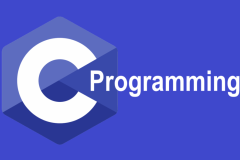In this Course, covers all the C Language concepts along with examples. it covers in depth coverage of all the concepts explain with explanation, syntax, syntax explanation and example programs. C Language is the basic language for all other programming language.
C is a very powerful and widely used language. It is used in many scientific programming situations. It forms (or is the basis for) the core of the modern languages Java and C++. It allows you access to the bare bones of your computer.
Yet, with great power comes great responsibility. C will not coddle you (okay, raise your hand if you think Matlab was coddling... well compared to C it was very generous to you). C will require your syntax to be even more perfect than Matlab. C will make you define every variable with a Type, and not let you ever change these (in a given program). C will assume you are a master of everything you do.
Further, C is a very basic language. There are no frills, no GUI's, no Matrix processing abilities, very little file I/O support, etc. (Note: to be honest, all of these things have been written in C and are available as libraries, but the core C language is in some sense, bare boned.)
Then, why do we use C?
- It was (and still is in some circumstances) the language of choice in Operating System Development (including all of Unix).
- It allows you direct control over the very low level aspects of the computer.
- Many legacy programs are written in C.
- Most of the things you learn with C will be directly transferable to future programming languages.
- Programs that are created with C run very quickly.
- C has a syntax (and some semantics) very close to Matlab, making the transition easy (okay, easier...).
- The programs you create in C will run "standalone". All of the programs we wrote in Matlab, need Matlab in order to work, and if you don't have access to Matlab, you are out of luck. C programs, once compiled into "executables", can be transferred to other (similar) machines, and run without the need for the source code.
- Many of the codes you will use in your future work/studies will have been written in C. You should at the least, be able to read them. And hopefully, you will be able to maintain, modify, and update them.











